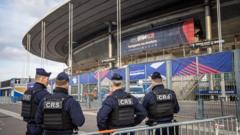In light of violence surrounding a recent UEFA match between Ajax and Maccabi Tel Aviv, Paris has implemented an extensive security operation for the upcoming France-Israel football international. Paris police chief Laurent Nuñez announced that 4,000 officers will be deployed, including 2,500 stationed at the Stade de France and additional personnel on public transport. In addition to these forces, 1,600 private security guards will assist in maintaining order at the stadium, and an elite anti-terrorist unit will provide protection for the Israeli squad.
Nuñez characterized the match as "high-risk," particularly given the tense geopolitical climate following recent incidents in Amsterdam where Maccabi supporters were attacked. As a precaution, the Israeli government has advised that only around 100 Israeli fans are expected to travel to Paris, despite a larger number of supporters likely attending from other countries.
This match occurs against a backdrop of alarming incidents in Amsterdam, where Maccabi fans were targeted after engaging in vandalism and chanting anti-Arab slogans. The unrest raised widespread concern over a resurgence of antisemitism in Europe, prompting politicians to condemn the violence. While Maccabi fans faced aggression, they also played a part in escalating tensions back in Amsterdam, further complicating matters.
Amid these developments, French President Emmanuel Macron plans to attend the match, expressing solidarity with the Jewish community following the recent violence. He will be joined by notable figures such as Prime Minister Michel Barnier and former presidents François Hollande and Nicolas Sarkozy.
To enhance safety, the area around the Stade de France has warned local bars and restaurants to close early, and matchgoers should expect stringent identity checks. In stark contrast, the scene in Paris is poised for protests, with pro-Palestinian groups rallying against the match, raising further integrity concerns about the event.
Political factions in France are divided over the match's significance, with the far-left party France Unbowed (LFI) asking for cancellation or for Macron to refrain from attending. Their calls stem from a perception of Israel's actions in the Middle East as genocidal, a claim Israel vehemently denies, alleging it to be a misrepresentation.
Despite pressures, Interior Minister Bruno Retailleau remains firm in refusing to cancel or relocate the match, asserting that "France does not give way to those who sow hatred." Already, the rivalry has built intensity; both teams previously met in Brazil, with France dominating the first leg.
Tensions between Macron and Israeli PM Benjamin Netanyahu have also escalated recently, creating a complicated backdrop for the match. As protests unfold and emotions are high, all eyes will be on Paris during this significant sporting event, underscoring the intertwining of sports, politics, and social issues in contemporary Europe.



















